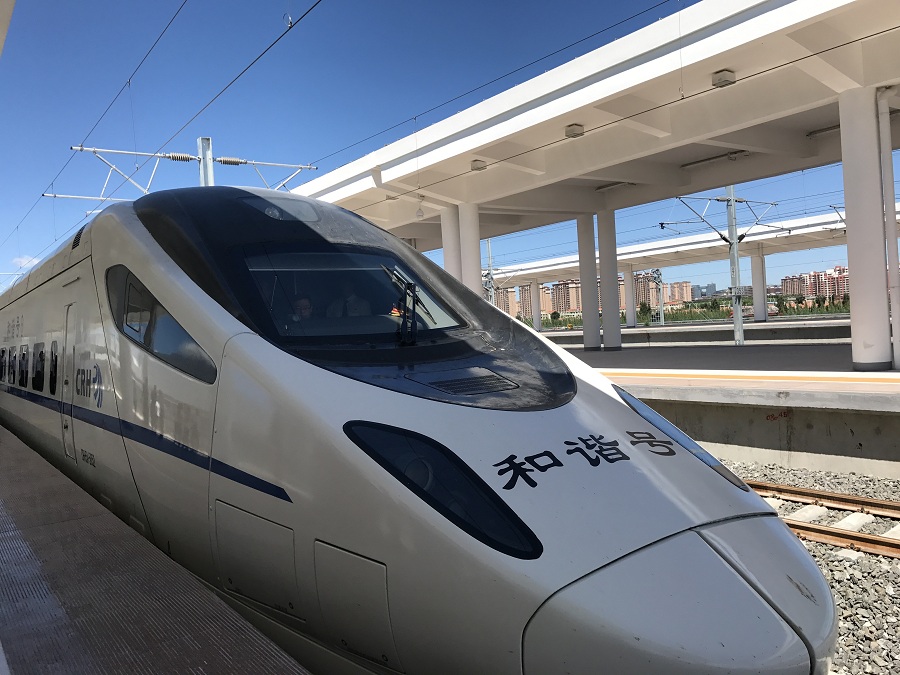Manzhouli Special:New railway line to boost trade and tourism with Eurasia
(chinadaily.com.cn)
Updated: 2014-05-05
The 11,800-kilometer Suzhou-Manzhouli-Europe railway line, which opened last September, is expected to boost China's trade with Eurasia.
The train line starts in East China's economic powerhouse, Suzhou in Jiangsu province. It runs to the Manzhouli port in North China's Inner Mongolia autonomous region and finishes in Warsaw, Poland. The whole trip takes 18 days.
Compared to other train lines the new railway cuts traveling time by four days and reduces costs by $2,100 per container.
Wang Wei, Party chief of Manzhouli, said: "The last stop on the Chinese mainland is Manzhouli. The train line is expected to play a pivotal role in the economic restructure and upgrade of the city. It will drive growth in the eastern Inner Mongolian autonomous region. The government also hopes to build on the line to become a spearhead for the region's opening to North China and boost development in the border area."
Sun Yuning, director of Manzhouli customs, said: "To date, the accumulated cargo, mostly electronic appliances, are worth $50 million. The opening of the international channel has optimized the trade structure of Manzhouli and lifted the incremental value for the port as most of the goods are technology-intensive ones."
Sun said currently each electronics container has an average value of $120,000, which equals four containers of clothes, 12 containers of chemical plates or 60 containers of coal. The new railway also drives economic growth in neighboring areas.
The director said that new lines connecting Manzhouli with Zhengzhou, the capital of Henan province, as well as Guangzhou, the capital of Guangdong province, are expected to start running soon.
"In the near future, Manzhouli is expected to become a golden hub for international logistics," he said.
In April, the line from Suzhou hosted four trains carrying liquid crystal monitors and laptops. The combined value of the trains was 57.24 million ($9.4 million). From March to June a further 12 trains were due to run.
Returning trains mostly carry vehicle parts from German automaker BMW bound for Shenyang and Beijing.
The line is expected to benefit China's trade with Poland, Hungary, Austria, Germany, Czechoslovakia, Romania, Ukraine and Russia.
According to the Inner Mongolian autonomous region's government, the new line is part of the country's strategy to boost technological and trade cooperation with Northeast Asian as well as European countries.
The line also meets rising demand from the country's plans to deepen its strategic cooperation with Russia and Mongolia.
Advantages
The selection of mainland destinations connecting to Manzhouli has a series of advantages.
Manzhouli is a hub for China's inland railway network and penetrates into West Siberia in Russia, which in turn links to Europe.
Currently, the port deals with 60 percent of railway transport between China and Russia.
A major railway upgrade in Binzhou, in nearby Shandong province, and the construction of a line between Chita and Zabaikalsk in Russia will improve transport capacity.
Rail freight capacity from the Manzhouli hub could reach 70 million tons a year. Last year capacity hit 30 million tons, among the most in the country.
Manzhouli is the country's appointed auto part and vehicle import port, due to its capacity.
In terms of cost, the port has comparative advantages.
A client company told China Daily that transport fees per kilometer via the Alashankou, Xinjiang Uygur autonomous region to Central Asia and Europe, was $0.142 per container, while trains via Manzhouli from Suzhou to Europe cost $0.06 per container. Sea transport was $0.045 per container.
The new line also cut transport time by four days within China and it was reduced within Russia as well, due to the upgrade of Russia's railway network.
Customers concerned about their goods, especially electronic appliances, also have greater peace of mind.
The Manzhouli line to Russia is relatively safe compared to other Central Asian countries.
Railway officials said the Russian government places high emphasis on frequent return trains, which can be a worry for customers. In the peak season five return trains run each week.
The Suzhou-Manzhouli-Europe rail line has unparalleled advantages due to its connection network.
It has widespread connections with West Siberia, as it has stops in Chita, Novoskbirsk, New Siberia, Omsk, Chelyabinsk, Ryazan, Moscow, Minsk, Brest, Warsaw, Berlin and Rotterdam. The line crosses nearly 10 major cities in Russia as well as 20 countries and regions in Europe.
Its stretches to the Commonwealth of Independent States, Yugoslavia, Bulgaria, Hungary, Chech, Slovakia, Poland, Germany, Austria, France, Belgium, Switzerland, Italy and Britain. As a result, it could be thought of as a "New Silk Road".
Picturesque city
The Suzhou-Manzhouli-Europe rail line is also expected to boost tourism in Manzhouli.
The city has natural grasslands, lakes, a river and wetlands and has mingled cultures of China, Russia and Mongolia.
The picturesque city covers 732 square kilometers with a population of 300,000.
Last year 4.91 million tourists visited, 543,000 of which came from overseas.
The total revenue of the tourism sector hit 4.38 billion yuan ($718 million) last year, accounting for 23 percent of the city's GDP.
The city is located on the Hulunbuir Grasslands and neighbors the Hulun Lake. A 12-hectare Erka Wetland and border river with Russia offers fabulous scenic views.
In summer tourists ride horses on the grassland and in winter they can go fishing and hunting on the ice lakes.
Tourists can visit the Zhalainoerensis human skull fossil, which is North China's earliest skull in history and the country's most complete mammoth fossil. Other attractions include China's largest Xianbei ancient tomb and Matryoshka Square, which boasts impressive architecture.
The city offers a mix of Western and Eastern cultures and visitors get a taste of revolutionary history.
It is one of the country's "Red" tourism centers and is home to the nation's only exhibition hall of the descendants of China's Red Army and the Sixth Plenary Congress of Chinese Communist Party held in Moscow, on June 18 to July 11, 1928. The conference was the only one held overseas.
It is hoped that the opening of the train line will lure more tourists to the city in the near future.
 |
|
The 10th Miss International of China, Russia and Mongolia was held in Manzhouli late last year. The city has a mixture of cultures from the three countries. |
Contact the writers at
yuanhui@chinadaily.com.cn.

High-speed train debuts in Inner Mongolia
A bullet train departed Hohhot East Railway Station for Ulanqab marking the start of high-speed rail services using Inner Mongolia’s first newly-laid high-speed railway on Aug 3.
